Covid in Scotland: The latest casespublished at 17:36 GMT 13 January 2023
A weekly update on Covid-19 cases, hospital admissions and deaths in Scotland.
Read MoreThe first minister gives a statement at Holyrood on the latest pandemic developments, including a focus on the Omicron variant
Nine cases have been confirmed in Scotland and all of them are linked to a single private event which took place on 20 November
There have been 2,569 new positive Covid-19 cases logged; there are 706 positive patients in hospital, 54 of those are in ICU, and there have been a further 10 deaths reported
Nicola Sturgeon told Holyrood about the "really good news" that cases in all age groups had fallen in the past week
She said the vaccine had played its part in keeping cases down and she urged all over 18 year olds to get jabbed
Opposition leaders questioned how ready the country's vaccination programme was. Ms Sturgeon said work was being done to increase staff and facilities
Lateral flow tests will be made available in shopping centres, supermarkets, garden centres, sports grounds and Christmas markets
BBC Scotland News
A weekly update on Covid-19 cases, hospital admissions and deaths in Scotland.
Read MoreAllow X content?
This article contains content provided by X. We ask for your permission before anything is loaded, as they may be using cookies and other technologies. You may want to read X’s cookie policy, external and privacy policy, external before accepting. To view this content choose ‘accept and continue’.
Allow X content?
This article contains content provided by X. We ask for your permission before anything is loaded, as they may be using cookies and other technologies. You may want to read X’s cookie policy, external and privacy policy, external before accepting. To view this content choose ‘accept and continue’.
Allow X content?
This article contains content provided by X. We ask for your permission before anything is loaded, as they may be using cookies and other technologies. You may want to read X’s cookie policy, external and privacy policy, external before accepting. To view this content choose ‘accept and continue’.
That's all from our live coverage for today.
Thanks for joining us.

 Glenn Campbell
Glenn Campbell
BBC Scotland Political Editor
Nicola Sturgeon has repeated that getting vaccinated is the single most important thing we can do to protect each other from Covid.
She’s also confirmed that the wider programme of booster jags recommended by the JCVI will be put in place in Scotland as soon as possible.
What she did not say is exactly who will be eligible and when. The Scottish government is still working out how best to deliver.
What we do know is that priority will be decided based on age and risk.
The first minister said there is enough vaccine available for what could be around a million extra doses but that more staff and facilities would be required.
The Conservatives have suggested the reopening of mass vaccination centres.
It may be harder to draw staff from elsewhere in the NHS when non-Covid services are getting back to normal and winter pressures are mounting.
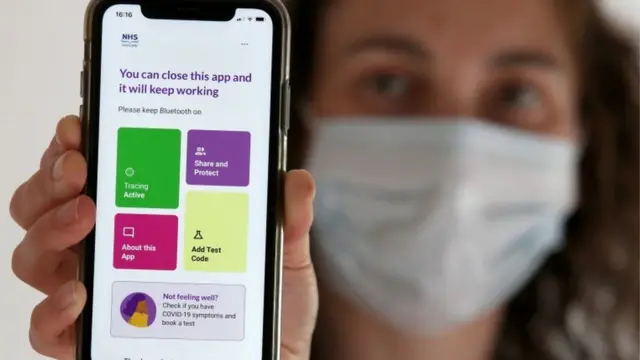 Image source, PA Media
Image source, PA MediaLib Dem leader Alex Cole-Hamilton says that variants "must be stopped in their tracks".
He asks the FM if she will start a programme of door-to-door surge testing in the areas where cases of Omicron have been detected.
"No, I won't" is the simple answer from Ms Sturgeon. She says it would not be the best use of resources under pressure.
She says she will not accept criticism of the "heroic" work being done by contact tracers.
The FM adds that that door-to-door testing would not be suitable in this case but she will allow health protection teams to drive enhanced testing in the way they see fit.
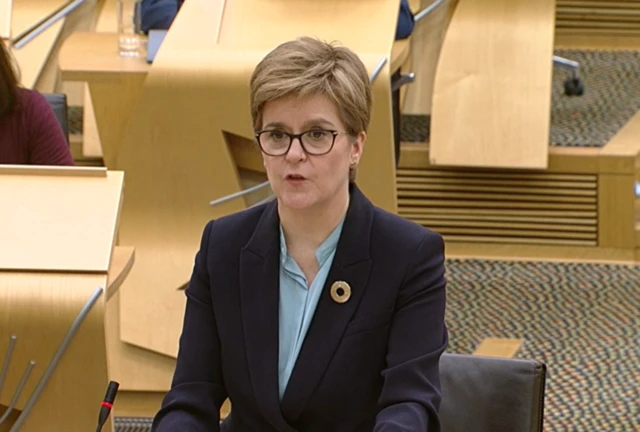
Mr Sarwar also asks whether Scotland will reintroduce vaccine drop-in centres and what additional resources will be given to test and protect.
The FM says she wants to "be careful" as drop-in centres could disrupt prioritisation - for example, by allowing a tranche of younger people to get the booster before older age groups.
She says she will keep Parliament abreast of how the ramping up of the vaccination programme is going, adding that work is ongoing to identify Omicron cases through the current test and protect system.
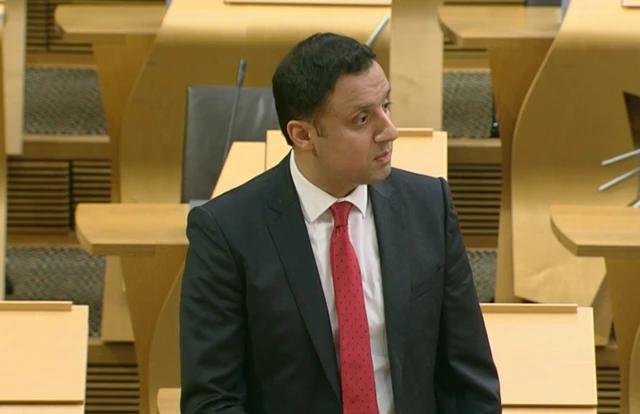
Scottish Labour leader Anas Sarwar asks the first minister whether she still holds a target of 400,000 vaccinations per week when the current figure is around 250,000
Nicola Sturgeon says her government will accelerate the programme "as far and as fast as we can", but argues the 400,000 target included flu vaccinations and is therefore being "exceeded".
However, she agrees they will have to increase the number of vaccines given on a weekly basis.
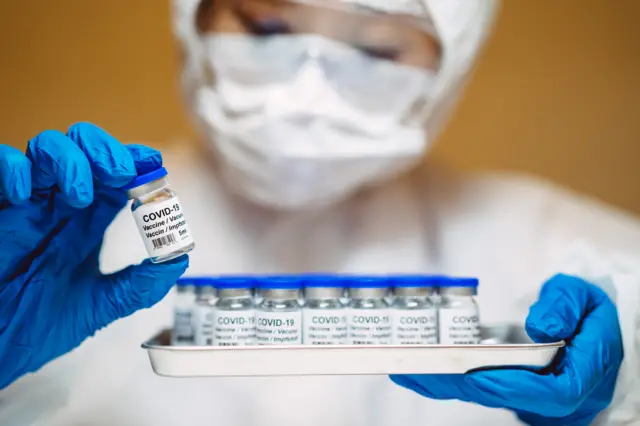 Image source, Getty Images
Image source, Getty ImagesThe first minister tells Douglas Ross there is no shortage of staff to give vaccines but says the new JCVI recommendations mean they will have to find more staff to speed up the booster programme.
She says she will work with health boards to make that happen as soon as possible.
Ms Sturgeon adds that there are adequate supplies of vaccines for the increased programme, despite there now being a million extra arms waiting for booster jabs.
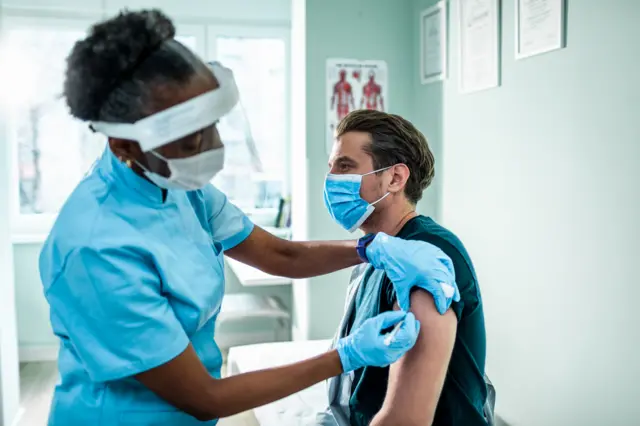 Image source, Getty Images
Image source, Getty ImagesScotland's health secretary Humza Yousaf confirmed to BBC Scotland this morning that one million additional Scots are now eligible for booster jabs.
It follows advice from the Joint Committee on Vaccination and Immunisation (JCVI) to extend the vaccination programme.
Boosters will be offered to all over-18s, and the wait after a second dose is being cut from six to three months.
Children aged 12 to 15 will also now be invited for a second jab.
Mr Yousaf told the Good Morning Scotland programme that the government had already started work on implementing the JCVI advice.
He said the biggest constraining factor was the amount of NHS staff required, but that "we will certainly do our best".
Scottish Conservatives leader Douglas Ross praises the "swift" reaction to the new variant from the UK and Scottish governments.
He highlights the effectiveness of the vaccine programme but wants to know why mass vaccination centres are not being set up immediately.
Ms Sturgeon says she remains more positive about the current Covid situation than a few weeks ago despite the new variant.
She says Scotland is in a stronger position to confront the winter than it was last year.
The routes the Scottish government chose to administer vaccines have put Scotland ahead of all other UK nations on vaccinating the population, the FM adds.
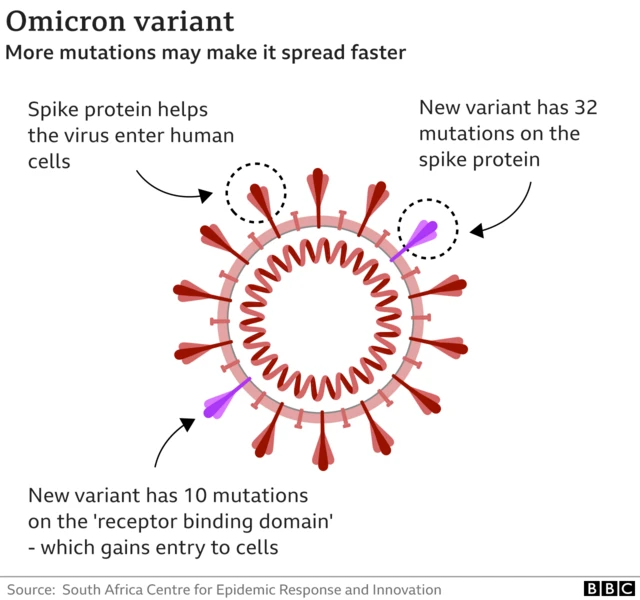
As we've been hearing, booster doses are at the centre of the fightback against the new variant.
But will they work as well as they have done with previous strains?
B.1.1.529, or Omicron, has experts particularly worried because it is very different to the original Covid, which current vaccines were designed to fight.
It has a long list of genetic changes - 50 in all. Of these, 32 are in the spike protein of the virus - the part which is the target of vaccines.
However, it is too soon to know how much of a threat it poses.
Current vaccines are not an ideal match so might not work quite as well, say experts.
But that doesn't mean they'll offer zero protection.
Vaccines are still very effective at protecting lives by cutting the risk of severe illness against other major Covid variants, including Delta, Alpha, Beta and Gamma.
Doctors say it is vital people get the recommended number of doses to gain maximum protection against existing and emerging variants.
Read more on how our current vaccines stack up against the new variant
Ms Sturgeon reiterates her call for people to get vaccinated despite concerns it may not offer total protection against Omicron.
She says even if that is the case, "less effective does not mean ineffective."
People can also pick up lateral flow tests at more locations including shopping centres, Christmas markets and garden centres, she adds.
Concluding her remarks, the first minister says the existing Covid measures - including face coverings, ventilation, hygiene and testing - are "more important than ever".
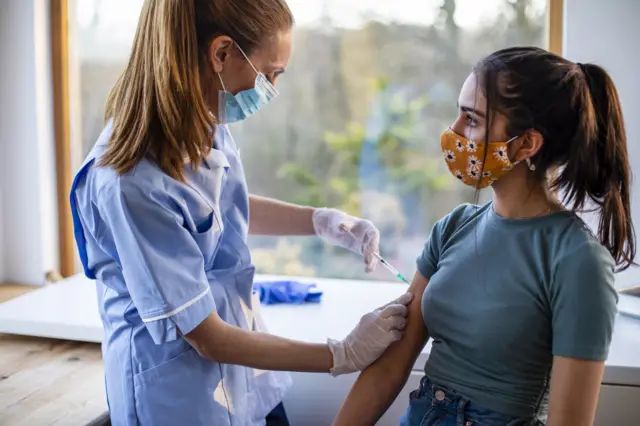 Image source, Getty Images
Image source, Getty ImagesThe first minister outlines the latest JCVI recommendations:
She adds that from today, 16 and 17-year-olds can book an appointment for their second dose online.
The first minister confirms her government will not introduce further measures to combat the new variant beyond temporary travel measures.
Anyone travelling back to Scotland from certain Southern African countries must enter managed quarantine for 10 days on their arrival.
Quote MessageThat will depend partly on what information emerges about Omicron in the days to come, but also and significantly on all of us complying rigorously with all the protections currently in place to stem transmission.
First Minister Nicola Sturgeon
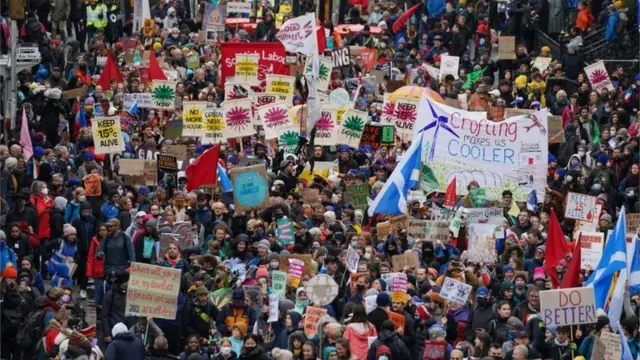 Image source, Getty Images
Image source, Getty ImagesMs Sturgeon says that given the nature and scale of COP26, surveillance work is looking at potential links.
But she says there is no evidence whatsoever of any such link - and, while it is not impossible that one will emerge, she believes the timelines make it improbable.
And she says that given the nature of transmission, she considers it highly likely - almost certain - that more cases, perhaps many more cases, will emerge.
The FM says that rather than introducing new protections now, people should "significantly step up" and increase compliance with existing protections including face coverings, hygiene, home working, ventilation, vaccination and regular testing.
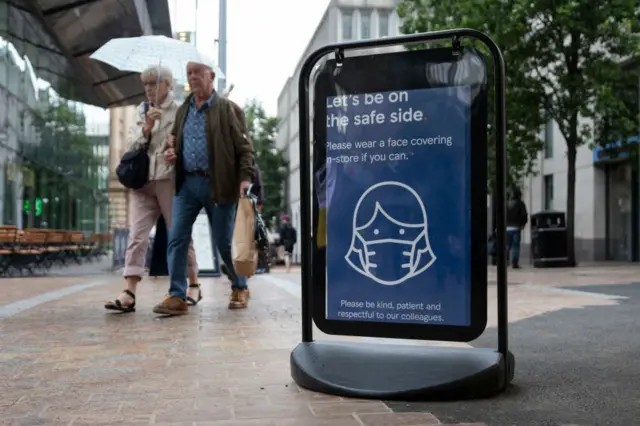 Image source, Getty Images
Image source, Getty ImagesThe FM gives details on the investigations taking place into the community transmission of Omicron.
She says none of the nine individuals, all linked to a private event, had any recent travel history or known links to South Africa where it was first identified - although contact tracing is still ongoing.
Due to the fact that cases are only linked to one event, Ms Sturgeon says that the community transmission of the variant is "limited" and there is "nothing to suggest" it is sustained or widespread.
None of the nine required hospital treatment, she adds.
The first minister confirms that all nine cases of the new variant in Scotland appear to have come from a single event on 20 November.
They were tested around 23 November and have since been self-isolating - but more cases are expected to come from this event, she says.
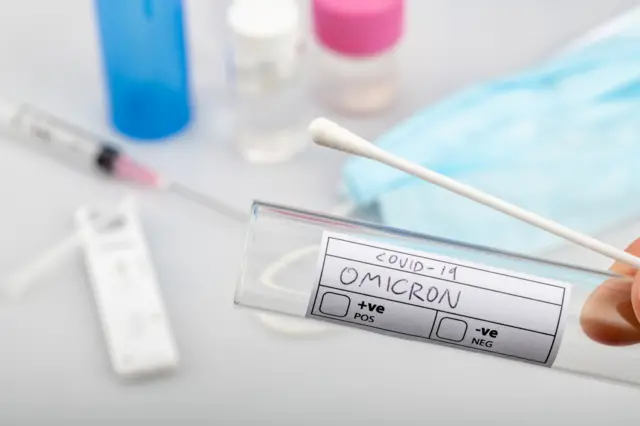 Image source, Getty Images
Image source, Getty ImagesThe FM says the new variant Omicron brings a new risk.
She says the most important point to make at this stage is that most of the key questions about the impact and implications of Omicron have not yet been answered.
But she does say that the number of mutations it has - and early indications from South Africa have raised the concern that it may be more transmissible than the Delta variant which is currently dominant.
She says there is no evidence at the moment that Omicron is more severe but we will know more in the weeks ahead.
The FM says we are hoping for the best while preparing for the worst.
Nicola Sturgeon says that her view last week was Scotland's Covid situation was "much stronger" and that case numbers had stabilised.
Despite the "deeply worrying" news about the emergence of the Omicron variant, she says that if anything, this week's data has been "even more encouraging".
Nine cases of the new variant have been detected in Scotland so far.
The first minister begins her statement to Holyrood saying she will outline the steps the Scottish government will take to slow the spread of the Omicron variant.
She will also say how it plans to curb the virus more generally.
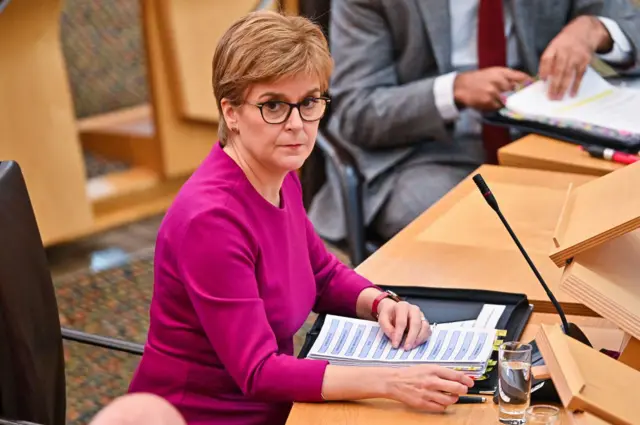 Image source, Getty Images
Image source, Getty ImagesNicola Sturgeon will shortly begin her weekly statement to the Scottish Parliament on coronavirus developments in Scotland.
Stick with us for full coverage, reaction and analysis.
You can also watch events in the Holyrood chamber on the BBC Scotland channel by clicking on the tab above.